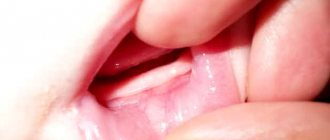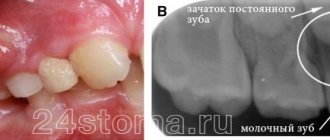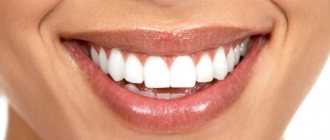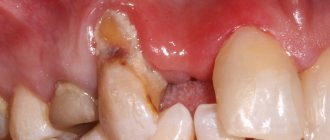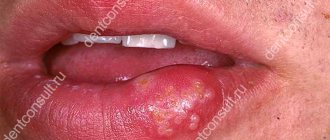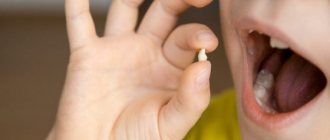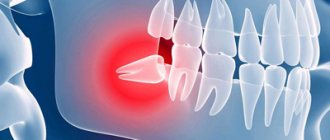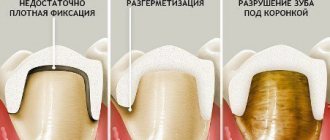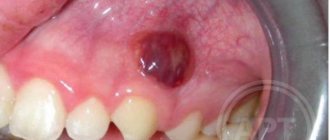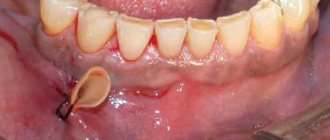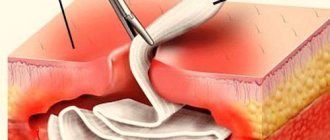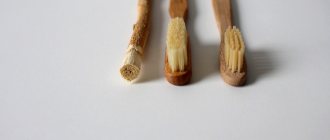For parents, the first days and months of a child's life are the most exciting. Every slightest deviation from the norm in a child’s health during a given period can cause serious concern, since the baby’s body is very vulnerable, and the range of treatment methods is very limited. Even the slightest cold is fraught with serious consequences. One of the problems that new parents often face is the formation of white pimples on the child’s gums. If your baby has a small, light-colored nodule, you need to consult a pediatric specialist. Only a specialist can determine the causes and origin of the pathology. More often than not, white pimples on a baby’s gums are a harmless phenomenon, but sometimes they still signal a progressive disease that needs quality treatment.
White pimples on the gums are not a pathology
Only a pediatric dentist can convince worried parents that there is no need to worry and that white spots in the child’s mouth are not an anomaly. Below we consider phenomena that are not dangerous to children's health:
- Bohn's nodules are small whitish formations that appear on the upper or lower gums. They are cysts in nature, but they do not pose a danger to the baby’s health. Over time, the nodules will go away on their own. In some cases, parents may mistake such formations for teeth that are beginning to erupt.
- Epstein's pearls look like small spots and are often located on the palate. This phenomenon also cannot be treated, since it does not pose a threat. The pearl oyster will go away on its own.
Whitish spots may be the remains of food that the baby consumed and then regurgitated. They should go away on their own within a short period of time because they are washed away by saliva. If the plaque does not go away for a long time, this is a reason to contact an experienced specialist.
Treatment
Treatment tactics will vary depending on which tooth the abscess has developed on. If inflammation appears on a baby tooth, then the only solution is to remove it, and the treatment plan will be something like this:
- a visual inspection of the affected area is carried out;
- local anesthesia is provided;
- the lump is opened and the pus is removed;
- the diseased tooth is also removed;
- medications are prescribed;
- home treatments that include rinsing the mouth with antiseptic solutions. This helps cleanse the mucous membrane of pus and stop inflammatory processes.
If a permanent tooth is affected, then the therapy will differ in that they will try to save the tooth by cleaning the affected parts and filling the canals.
Thus, we emphasize that visiting the dentist if you find an abscess in a child is mandatory. The spread of infection will not go away on its own; on the contrary, it will affect other tissues, including the rudiments of permanent teeth.
What phenomena are considered serious?
There are a number of pathological reasons that explain the appearance of pimples on a child’s gums. Thrush often occurs in infants due to a weak immune system. In appearance, thrush resembles cheesy whitish soft deposits. In infants, pathology can occur as a result of transmission of the fungus from the mother. The weak immunity of infants is not yet able to resist such infections.
White plaque on the lower or upper gums can appear under the influence of unfavorable factors:
- Prematurity.
- Allergy.
- Metabolic disease.
- Poor quality food.
- Inflammation in the body.
- Sick intestines as a result of microflora disturbance.
In the cases listed above, whitish dots may form on the mucous membrane, so the child should be shown to a doctor without fail.
What should parents be wary of?
- Candidiasis – whitish small ulcers appear in the baby’s mouth. They are usually covered with a whitish, cheesy coating. There is a sour smell from the mouth, and the body temperature may rise. The sores can be painful and itchy, causing babies to become restless.
- Bacterial stomatitis - small pimples on the gums and inner surface of the cheeks, heavy plaque - these are the main symptoms of the disease. An increase in temperature and deterioration in general condition may also occur.
- Viral infections. Symptoms are similar to those of bacterial stomatitis. Spots on the upper and lower gums and tongue visually resemble small watery blisters.
- Non-infectious stomatitis. It may manifest itself as a consequence of anemia and lack of vitamins. Also, a similar form of stomatitis occurs after the baby is weaned. Small spots are accompanied by pallor of the skin, the baby eats little and does not gain weight well.
- Cyst. This is a serious problem caused by bacterial infections. The symptom is an accumulation of pus. A fistula may develop from the cyst, through which purulent exudate emerges.
Symptoms
Symptoms can be divided into general (malaise, fever) and local (pain in the tooth area and when eating, redness and swelling of the gums, development of an abscess).
At the initial stages there are no external manifestations. Then the gums become red, swollen and painful when touched. The next stage is an increase in swelling, which forms due to the fact that pus begins to accumulate between the surface of the bone and the periosteum. After which it gets under the mucous membrane and a lump is formed.
As the abscess matures, it becomes white and the pain can spread to the entire jaw. The body temperature often rises, the child refuses to eat and is capricious.
Children may not always complain of discomfort, especially if they are still very young, so parents should regularly examine the oral cavity themselves.
What is the danger of candidiasis and how to prevent it
Babies under the age of six months are especially susceptible to the disease. Fungi from the genus Candida contribute to the development of pathology. Obvious symptoms are the formation of a white coating, which is accompanied by inflammation and the appearance of spots. With severe lesions, the spots may begin to bleed. In their advanced form, the spots resemble a fairly strong and dense film that completely covers the oral cavity. As a result, cracks appear, causing further slight bleeding. On many sites and forums you can familiarize yourself in detail with the pathology from the photo. Babies, when eating and swallowing, experience pain, become lethargic and capricious. The temperature may rise. In case of such damage, it is necessary to show the child to a pediatric dentist as soon as possible. Ways to prevent illness:
- After each breastfeeding, you should give your baby a drink of warm water. The liquid will remove any remaining milk in your mouth.
- Mothers should wash their hands thoroughly and maintain good body hygiene.
- If the disease has already been cured, do not allow it to recur. Regularly treat children's accessories with boiling water.
Preventive measures must be taken to ensure that pimples on the gums no longer appear. Avoid sugary drinks as they can trigger a recurrence of thrush as fungi multiply quite quickly in such an environment.
Features of treatment for children with small pimples on the gums
Whatever the diagnosis, dad and mom should be very careful. It is necessary to understand that self-medication of an infant is fraught with dangerous consequences. Once the reasons for the formation of pimples on the upper or lower gums have been accurately determined, the recommendations of the pediatrician should be strictly followed. The treatment method will depend on the diagnosis:
- Plaque must be carefully removed using a regular gauze pad.
- For thrush and infectious stomatitis, it is necessary to eliminate the cause of the disease. Only a doctor can accurately determine the nature of the disease and correctly prescribe medication. It is important to understand that viruses can only be effectively treated with antiviral drugs. To eliminate diseases caused by streptococci and staphylococci, antibacterial drugs will be needed. For fungal infections, antifungal drugs are prescribed.
If white pimples appear on the gums and the baby’s body temperature quickly rises, you need to monitor the water balance and let the baby drink as much as possible. Hot drinks are not recommended; it is better to drink the child with plain clean water. If necessary, you can give your baby an antipyretic, after consulting with your pediatrician. If the dentist diagnoses a malignant tumor, surgical intervention will be required. For Epstein pearls, no treatment is necessary; small spots will go away on their own. To avoid complications and recurrence of the problem, parents should monitor the condition of their children's oral cavity. In the autumn-spring period, children are more vulnerable to colds and viral diseases, which can cause problems.
What rules should you remember?
Babies under one year old are very vulnerable to external factors that carry great health risks. Every mother should be able to accurately determine the pathology and process of teething. If you detect the slightest violation, you should immediately seek help. What rules must be followed:
- Your baby's dishes and toys should be perfectly clean. To maintain cleanliness, you can rinse them with boiling water or wash them with baking soda.
- Establish a proper diet.
- Treat any diseases in a timely manner.
- Improve the functioning of the immune system in every possible way.
- If a small pimple appears in the mouth or a spot appears that does not go away on its own, there is no need to self-medicate, you should immediately go to the pediatrician.
- Nursing mothers are advised to completely exclude foods that are harmful to the baby from their diet. Salt and sugar can negatively affect the baby's health.
- After each feeding, carefully and carefully clean the baby's mouth so as not to damage the mucous membrane and cause pain to the baby.
- For the first teeth, special accessories are used for cleaning and oral hygiene.
- Remember: using pacifiers for too long can negatively affect the development of the bite and provoke early caries of baby teeth.
- No matter how old the child is, he should visit the pediatric dentist regularly.
- Do not try to cure gum pimples on your own.
Prevention
To prevent the occurrence of pathology, preventive measures should be taken.
- The baby’s mouth should be cleaned after any meal and rinsed with boiled water.
- Mother and child should eat a balanced diet.
- It is necessary to protect the baby from kissing people who have sore gums, from traumatic games, and from chewing objects with sharp edges.
- Pacifiers, toys, bottles should be perfectly clean, like the hands of a toddler.
- See your dentist regularly for preventative checkups.
- The baby must use a separate towel and utensils.
Course of therapy
Moms and dads should understand that buying medications on their own and giving them to infants is strictly prohibited. Many tablets, ointments and gels are contraindicated for children. You can treat your baby only with the drugs that your pediatric dentist recommends. After the baby has eaten, you can give him one tablespoon of clean water, this will help get rid of food residues on the tongue. Before each feeding, the mother should wash her breasts well. It is not advisable to use aromatic shower gels. Also, some doctors recommend that nursing mothers wash their breasts with a weak soda solution. The drug Candide effectively helps with thrush. If the pediatrician determines that the baby has vitamin deficiency, he will prescribe the necessary medications and suggest that the mother reconsider her diet. Such remedies as Nurofen or Panadol will help relieve fever and relieve pain. Acyclovir is popular among antiviral drugs. If the bumps are filled with pus, the doctor will prescribe antibiotics. Among folk remedies, decoctions and infusions of calendula, chamomile and sage work well. Before adding a traditional method to your course of therapy, you must consult with a specialist.
Reasons for the appearance of pimples on the gums of an adult
Adults are also susceptible to the appearance of various formations in the oral cavity. Pathogenic microflora develops very quickly in the oral cavity of an adult. You should be wary of such formations as:
- Small pimples concentrated throughout the mouth.
- A single pimple on the gum.
- Fistula around a tooth.
In adults, white pimples occur for the same reasons as in children. In modern dentistry, there are many reasons for the development of diseases:
- Bad habits.
- Lack or improper oral hygiene, which leads to the active proliferation of bacteria.
- Poor nutrition, sugar abuse.
- Chronic and untreated diseases.
- Long-term use of potent medications.
In adults, rashes may indicate the presence of herpes. A small red rash indicates an allergy. You should not try to eliminate a pimple on your own. Do not pierce ulcers with needles or other sharp objects. This can lead to infection. It is also not recommended to heat formations in the oral cavity.
Since it is quite difficult to independently identify and eliminate the cause of diseases, it is necessary to immediately contact a specialist at the first signs.
Possible complications
If you do not consult a doctor when the abscess forms, it will increase in size and eventually burst. This will improve the child’s general condition (pain will decrease and the temperature will drop), but will lead to the formation of a fistula through which pus will escape into the oral cavity.
In some cases, the fistula heals on its own, but still represents a source of infection, which threatens to activate the inflammatory process under certain conditions (with decreased immunity).
If an abscess appears as a result of a disease in a baby tooth, it can cause infection of the permanent bud. In addition, bacteria from the abscess can enter the mucous membrane of the tonsils, provoking the development of chronic inflammation, as well as into the lymph nodes under the jaw, causing lymphadenitis.
Another danger of having a fistula in a child’s mouth is allergization of the body. In the most severe cases, pus can enter the bloodstream, after which it spreads throughout the child’s body and can cause suppuration in other organs and tissues. No less dangerous is the spread of infection into the deeper tissues of the jaws with the formation of phlegmon or inflammation of the bone.
